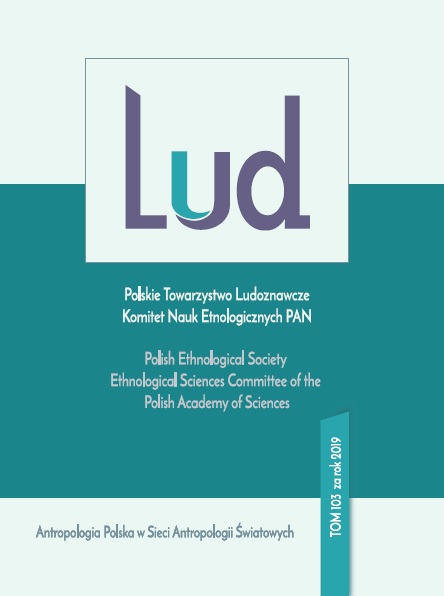The seductions of Europe and the solidarities of Eurasia
DOI:
https://doi.org/10.12775/lud103.2019.02Ključne reči
Europe, Eurasia, solidartidy, seductionApstrakt
Almost 40 years ago, when I was doing fieldwork in Poland, the word Solidarity was on everyone’s lips. One of the popular rallying cries, here and elsewhere in the region, was that of “rejoining Europe”. Similar ebullience was found in many Western countries at the time, justified by the increasingly progressive politics of the European Economic Community (as it was known at the time) and by the intellectual vogue for “civil society” as a key component of the continent’s liberal Enlightenment heritage.
Today, in Poland and elsewhere in Europe, scepticism toward the idea of solidarity at the level of the EU runs deep. Populist politicians thrive and liberal civil society struggles. Why is this happening? Where else in the contemporary world can solidary solutions to the problems of the planet be forged?
The answer given in this lecture will be radically Eurosceptic. Without denying the remarkable accomplishments of Europe since classical antiquity, it is necessary to place them in wider contexts. The landmass should be conceived as Eurasia, of which Europe is an important macro-region; it is an equivalent of China, not of Asia. The lecture will touch briefly on Axial Age theory, when social solidarities emerged on an unprecedented scale across the landmass, accompanied by ideas of moral universalism. It will also expound Jack Goody’s thesis concerning “alternating leadership” between East and West since the urban revolution of the Bronze Age. If we follow Goody by abandoning the rhetoric of a “European miracle” and look instead to Eurasian commonalities over the last three millennia, we shall be in a better position to create the geopolitical and moral solidarities urgently needed by humanity.
Reference
Buchowski, Michał 2009 “Property Relations, Class, and Labour in Rural Poland” in László Kürti and Peter Skalnik (eds), Postsocialist Europe. Anthropological Perspectives from Home. pp. 51-75. New York: Berghahn.
Eriksen, Thomas Hylland. 1995 Small Places, Large Issues. An Introduction to Social and Cultural Anthropology. London: Pluto.
Firth, Raymond. 1981. “Engagement and Detachment: Reflections on Applying Social Anthropology to Social Affairs” Human Organization 40 (3): 193-201.
Goody, Jack. 2003. “Sorcery and Socialism.” In Distinct Inheritances: Property, Family and Community in a Changing Europe, edited by Hannes Grandits and Patrick Heady, pp. 391–406. Münster: LIT.
Goody, Jack. 2010. The Eurasian Miracle. Cambridge: Polity.
Hann, C. M. 1985 A Village Without Solidarity. Polish Peasants in Years of Crisis. New Haven: Yale University Press.
Hann, Chris. 2016a. “A Concept of Eurasia.” Current Anthropology 57 (1): 1–27.
Hann, Chris. 2016b “The Wisłok Project, 1978-1985.” Lud 100: 83–92.
Hann, Chris. 2019 Repatriating Polanyi. Market Society in the Visegrád States. Budapest: Central European University Press.
Kubik, Jan. 1994. The Power of Symbols against the Symbols of Power: The Rise of Solidarity and the Fall of State Socialism in Poland. Pennsylvania: University of Pennsylvania Press.
Mach, Zdzisław. 1993. Symbols, Conflict, and Identity. Essays in Political Anthropology. Albany, NY: State University of New York Press.
Malewska-Szałygin, Anna. 2017. Social Imaginaries of the State and Central Authority in Polish Highland Villages, 1999–2005. Newcastle: Cambridge Academic Publishing.
Piketty, Thomas. 2018. “2018, l’année de l’Europe.” Le blog de Thomas Piketty, January 16, 2018, http://piketty.blog.lemonde.fr/2018/01/16/2018-lanneede-leurope/.
Rakowski, Tomasz. 2016. Hunters, Gatherers, and Practitioners of Powerlessness: An Ethnography of the Degraded in Postsocialist Poland. New York: Berghahn.
Thomas, William I. and Florian W. Znaniecki. 1918-19. The Polish Peasant in Europe and America. Chicago: University of Chicago Press.
Downloads
Objavljeno
Kako citirati
Broj časopisa
Sekcija
Licenca
1. Autorzy udzielają wydawcy (Polskiemu Towarzystwu Ludoznawczemu) licencji niewyłącznej na korzystanie z utworu w następujących polach eksploatacji:
- utrwalanie Utworu/przedmiotu prawa pokrewnego;
- reprodukowanie (zwielokrotnienie) Utworu/przedmiotu prawa pokrewnego drukiem i techniką cyfrową (ebook, audiobook);
- wprowadzania do obrotu egzemplarzy zwielokrotnionego Utworu/przedmiotu prawa pokrewnego;
- wprowadzenie Utworu/przedmiotu prawa pokrewnego do pamięci komputera;
- rozpowszechnianie utworu w wersji elektronicznej w formule open access na licencji Creative Commons (CC BY - ND 4.0).
2. Autorzy udzielają wydawcy licencji nieodpłatnie.
3. Korzystanie przez wydawcę z utworu na ww. polach nie jest ograniczone czasowo, ilościowo i terytorialnie.
Stats
Number of views and downloads: 621
Number of citations: 2



